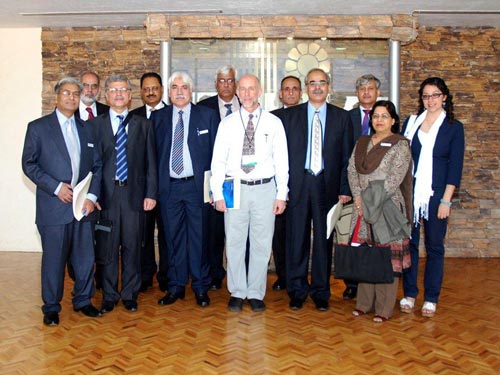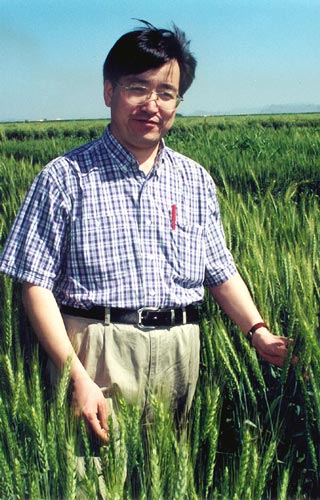 The strength and breadth of the fruitful five-decade partnership between Pakistan and CIMMYT have grown significantly in recent years: this was one conclusion from the visit to CIMMYT on 29 May 2012 of a 12-member team of senior civil servants, ambassadors, and corporate executives from Pakistan.
The strength and breadth of the fruitful five-decade partnership between Pakistan and CIMMYT have grown significantly in recent years: this was one conclusion from the visit to CIMMYT on 29 May 2012 of a 12-member team of senior civil servants, ambassadors, and corporate executives from Pakistan.
The event was one leg of a foreign study tour by the group, as part of the 96th National Management Course given by the government of Pakistan’s National Management College. Designed to sensitize participants in public policy formulation and implementation, diplomacy, and external and bilateral relations, the tour’s stop at El Batán gave the visitors a broadbrush overview of Pakistan and CIMMYT’s shared history, of global challenges to food security, and how our current and future partnerships address them.
As emerged in the CIMMYT presentations, Pakistani policymakers, researchers, and farmers played a key role in the Green Revolution. In 1961 as part of his work with Norman Borlaug, Pakistani FAO trainee Manzoor Bajwa (later Director General of Pakistan’s AYUB Agricultural Research Institute) selected Mexipak, a high-yielding wheat that would eventually become the country’s most popular variety. In 1966, Pakistan imported 41,000 tons of Mexipak seed from Mexico and, only two years later, harvested 7 million tons of wheat, making it the first country in Asia to achieve self sufficiency for the crop. Sixty percent of the wheat seed to be sown in Pakistan this year comes from direct CIMMYT selections, and at least half the improved maize varieties grown are derived from joint Pakistan-CIMMYT breeding research. In the late 1990s-early 2000s, with CIMMYT support, Pakistan researchers helped launch conservation agriculture in South Asia.
From our shared history, the discussions moved to challenges to food security for humanity and for individual nations like Pakistan, as well as solutions. On the latter, the visitors learned of the global alliances MAIZE and WHEAT and—as examples of country and regional initiatives— the Sustainable Modernization of Traditional Agriculture with Mexico, including the Wheat Yield Consortium and Seeds of Discovery project, and the Borlaug Institute for South Asia (BISA). Despite having arrived in Mexico the previous day after more than 30 hours of travel, the visitors were attentive and inquisitive, with questions about CIMMYT’s policies on intellectual property, about genetically-modified crops, about small-scale farmers’ access to improved seed and the role of transnational seed companies, and about the rationale for research on wheat photosynthesis, to name a few topics.
There was an excellent presentation on legal aspects of the Pakistan-CIMMYT partnership and on the germplasm bank. Four Norman Borlaug Fellows (a program funded by USDA) from Pakistan accompanied the visitors for lunch, where talk touched upon how to improve practical aspects of the Pakistan-CIMMYT partnership. “We came here to learn,” said Ahmed Yar Khan, Director General of the National School of Public Policy, “and we have learned many things. We’ll certainly take back the messages we’ve heard to our colleagues in Pakistan.” CIMMYT also took the opportunity to thank the Embassy of Pakistan in Mexico for its typically excellent assistance in organizing the visit and arranging visas.
CIMMYT director general Thomas Lumpkin, who was traveling in South Asia at the time, was pleased to hear the visit went well and thanked everyone involved: “I am sure that Dr. Borlaug would be smiling, knowing that we are making good progress to rebuild a relationship with a country that was so important to him.”
 Capacity development
Capacity development 

